


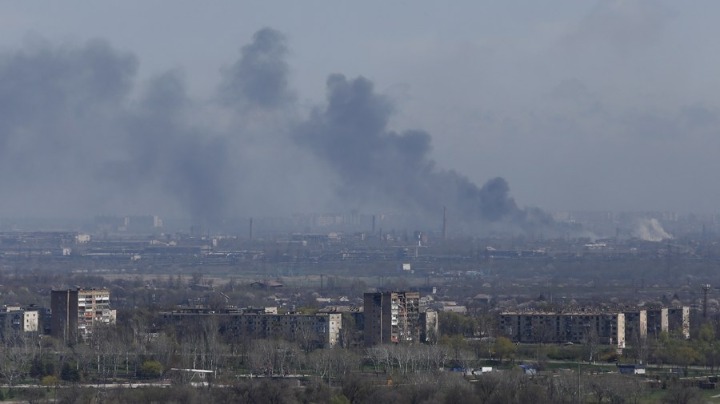
Russia's President Vladimir Putin says his country will continue its yearlong "special military operation" in Ukraine, and he accused the US-led NATO alliance of fanning the flames.
Russia-Ukraine conflict would have cost world economy $1.6 trillion in 2022, according to a study published by the German Economic Institute.
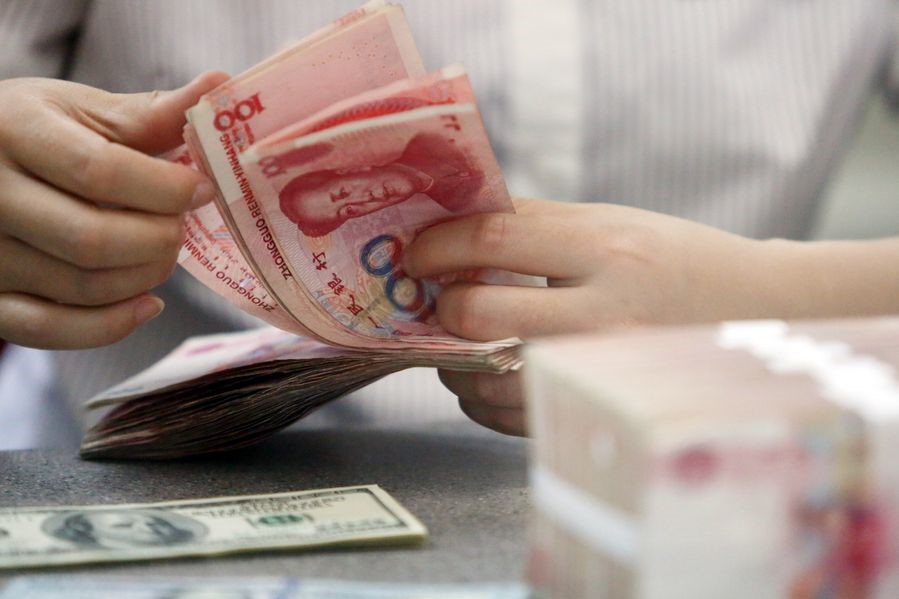
The ongoing geopolitical risks are unlikely to send China's inflation soaring or derail the Chinese central bank's cycle of easing, experts said on Wednesday.
"I think China's producer price inflation (which gauges factory-gate inflation and narrowed to a half-year low of 9.1 percent in January) will still be on a declining trend that started in the past couple of months, though the disinflationary process will take longer because of higher global energy and commodity prices now," said Tommy Wu, lead economist at British think tank Oxford Economics.
As inflation-China's consumer price index grew by 0.9 percent year-on-year in January, the lowest in four months-remains largely mild while economic growth is under pressure due to domestic factors and a more complex external environment, Wu said more easing measures are on the horizon in China.
Wu said he expects the People's Bank of China, the country's central bank, to implement another cut in the interest rate of medium-term lending facility, a key policy rate, in the second quarter of the year, following a cut in January.
The comments came after geopolitical tensions sparked concerns that tighter oil and food supply could further inflame already elevated global inflation. The International Monetary Fund and the World Bank jointly released a statement on Tuesday warning that "commodity prices are being driven higher and risk further fueling inflation".
Some experts, however, said the price shocks might have only modest impacts on China as the country's food supply is largely self-reliant while oil-related products have a limited weight in the basket of China's consumer price index, a key gauge of inflation.
The impacts of tighter external supplies of wheat and corn to China are likely to be limited given the country's relatively low grain import reliance, grains' small weight in the CPI and the ability to substitute across different types of grains, a Goldman Sachs report said, adding only 4 percent of wheat consumed in China is imported.
Also, the report said rising oil prices have not posed a significant upside risk to Goldman Sachs' forecasts about China's inflation, which had already incorporated a bullish estimate of oil prices.
Experts said China's softening price rises have widened the room for monetary easing. The country has the "capabilities and conditions" to effectively cope with external shocks and domestic downward pressure, maintain overall stability of inflation and remain a bright spot in the global economy, said a PBOC statement published on Monday.
The central bank will flexibly and properly adjust the intensity, pace and focus of monetary policy, guide financial institutions to boost credit expansion and promote a decline in corporate financing costs, the statement said.
Wang Tao, head of Asia economics and chief China economist at UBS Investment Bank, said she expects the PBOC to further reduce the reserve requirement ratio in March or April, adding that the loan prime rate, the benchmark lending rate, may drop slightly in the remainder of the year.
The upcoming two sessions-the annual sittings of China's national legislature and top political advisory body-are likely to set a "prudent" monetary policy tone as usual but emphasize that the monetary policy should provide appropriately ample liquidity and increase financial support to the real economy, Wang said.
"This means that the monetary policy will be biased toward easing, but without liquidity flooding," she said.
Experts nevertheless remain wary of any unexpected worsening of geopolitical tensions that could significantly exacerbate inflationary pressure facing China and curtail the monetary policy in supporting the economy.
According to Wu from Oxford Economics, there remains an upside risk to China's food inflation as Ukraine accounts for 30 percent of China's corn imports used in feeding hogs, while pork prices serve as a main component of the CPI.
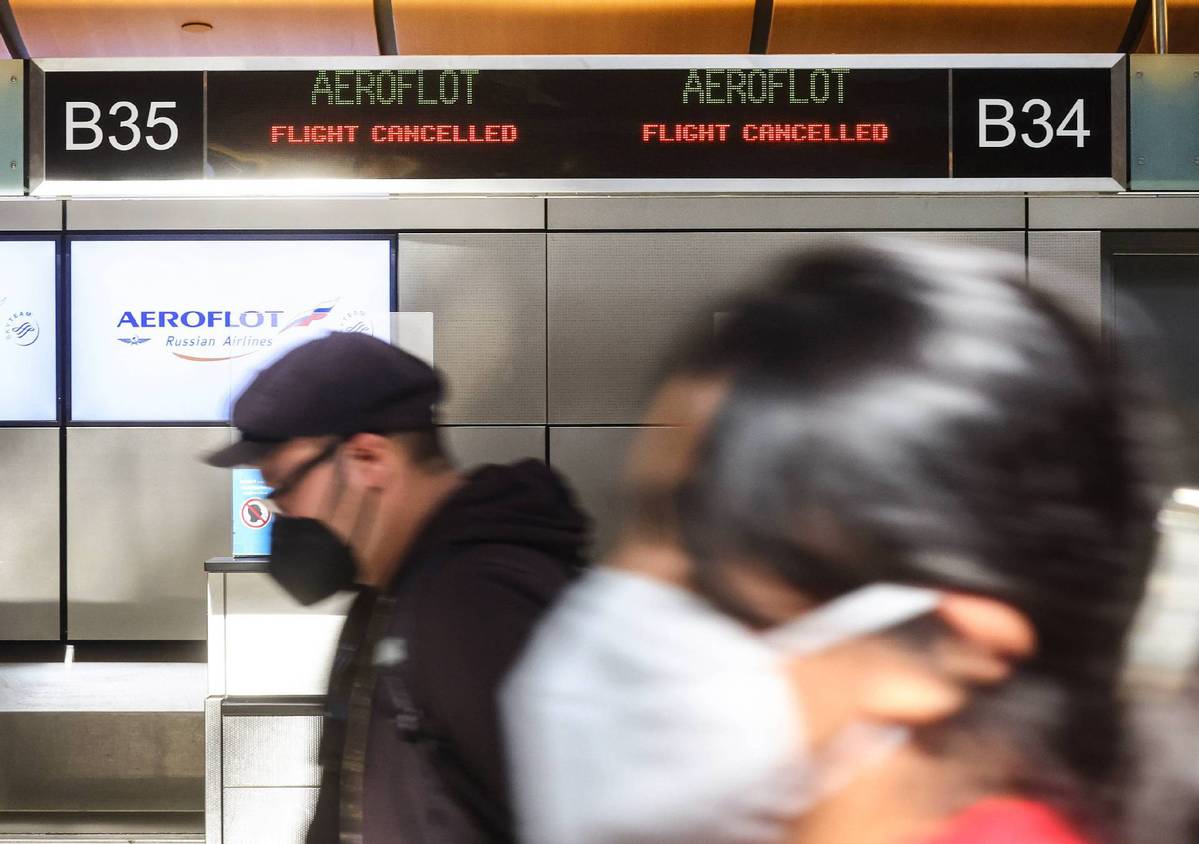
The United States has joined the European Union and Canada to ban Russian aircraft from making flights to the United States or from traveling over the US on its way to other destinations.
The ban announced Tuesday night by President Joe Biden in his State of the Union address to Congress would prohibit passenger or private planes that are owned or registered by Russians from flying over the US, hampering the ability to travel, especially for the wealthy. But the ban would have limited impact because Russian aircraft don't have to fly over the US to get to other destinations.
No US airlines fly to Russia, but European airlines fly over Russia more often than their US counterparts. If Russia responds by prohibiting US flights over its territory, it would cause longer and more costly flights for cargo carriers. FedEx and UPS both fly over Russia and announced this weekend that they were suspending deliveries to that country. Russia also gets a sizable amount of money from fees that it levies to use its airspace or land at its airports.
Closing US airspace to Russian aircraft followed moves by the European Union and Canada earlier this week.
On Sunday, the EU banned all travel from Russian planes over its airspace in response to the Russia and Ukraine conflict. That ban applied to "any plane owned, chartered or otherwise controlled by a Russian legal or natural person" and included any aircraft privately owned by a Russian oligarch, officials said.
When Canada announced its ban, Aeroflot, Russia's national airline and the only Russian airline that flies between that country and the US, announced on Monday that it had suspended flights to New York, Washington, DC, Miami and Los Angeles through Wednesday. The airline had 55 flights scheduled into the US for this month.
American Airlines, which had used Russian airspace en route to India, started rerouting flights before the conflict began. United Airlines said on Tuesday that it had temporarily stopped flights to India and will avoid Russian airspace
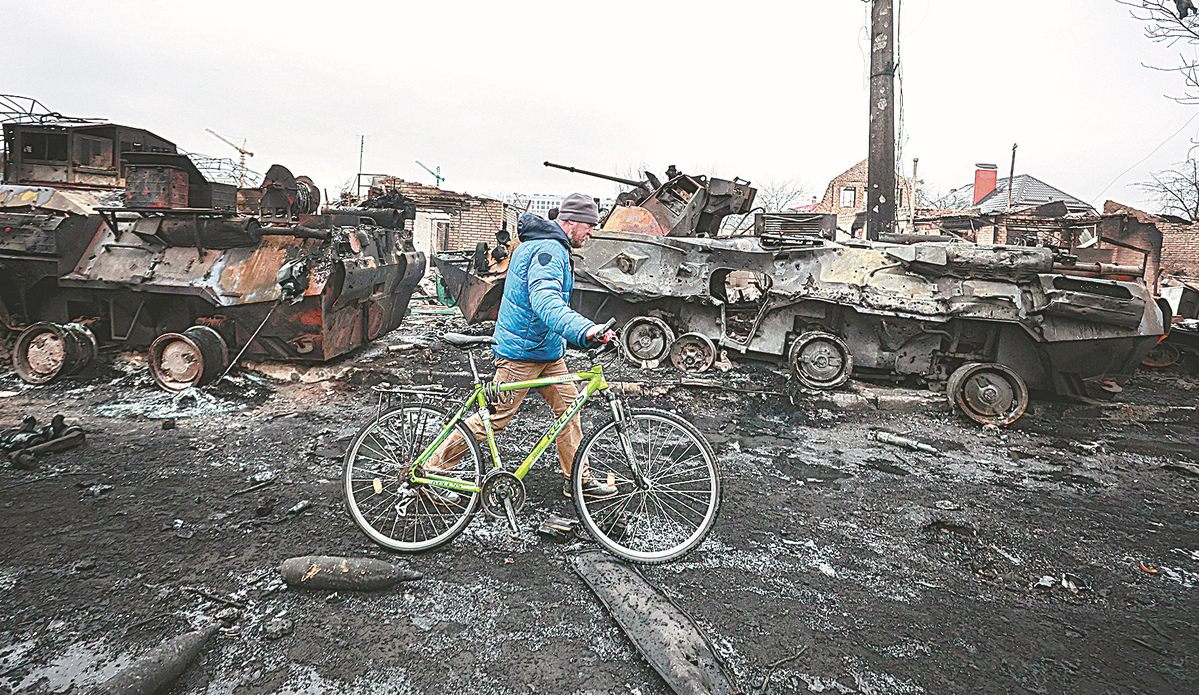
History shows that sanctions rarely achieve the kind of political objectives they are designed for, although they can cause fairly sizable economic damage to the sanctioned country.
Former US president John F. Kennedy sent his press secretary Pierre Salinger to buy 1,200 H. Upmann Cuban cigars before signing a sanction bill against Cuba in February 1962. Sixty years later little has changed in Cuba according to the United States' wishes. Nor have the on-and-off sanctions imposed on Iran since 1987 changed much of Teheran's behavior. Instead, the US is back to the negotiation table with Iran.
The sanctions announced by the US and its allies against Russia for triggering a conflict with Ukraine appear "tsunamic" in terms of scope and scale now. But their long-term impact is not likely to change Russia's trajectory of foreign policy in the region.
And although the sanctions will hurt Russia's economy as much as it has hurt Iran's, they will add yet another chapter to the history of the futility of sanctions. In fact, I doubt whether the sanctions will cause as much damage to the Russian economy as they did to Iran's.
Among the sanctions announced by the US and its allies, two are very significant-blocking Russia's central bank from using the country's nearly $630 billion foreign exchange reserves, which could reduce its ability to stabilize the Russian currency of ruble; and ejecting some Russian banks out of the Society of Worldwide Interbank Financial Telecommunication system, which provides highly secure communication for and dovetails with the many and varied operations of commercial banks in international transactions.
Russia has already withstood a round of severe sanctions, which the West imposed on it in 2014 following the Crimean incident, and has since developed into what is called a "fortress economy". That means it has been curtailing imports and trying to develop indigenous production capabilities that are relatively insulated from the global economy. And it has built large foreign exchange reserves of about $630 billion from the revenues from export of oil and gas.
True, the ban on Russia's central bank limits its ability to use some of its foreign exchange stockpile. But it cannot stop it from using all of it, because a large part of the reserves are in gold, which is not likely to be affected by the sanctions.
Indeed, the psychological shock the conflict and the sanctions have caused can spread panic across markets-already evident in people rushing to banks to withdraw money. But such shocks can be treated by using other regulatory means. In the short term, yes, the ruble is going to tumble, but after a while the Russian currency and economy are likely to stabilize.
Besides, the West's move to punish Russia through sanctions appear somewhat half-hearted when it comes to SWIFT, because transactions related to oil and gas trade are supposedly exempted. Is it because Europe gets about 40 percent of its natural gas and more than 25 percent of its oil from Russia?
By the way, in the global market, Russia accounts for about 13 percent of the oil and gas supply.
Overall, Russia still has a sizable set of trading partners that can help it solve some of its foreign currency problems. None of BRICS countries believe the sanctions will work. Even in the Arab world, the United Arab Emirates abstained from voting on a United Nations draft resolution co-authored by the United States condemning Russia for its "aggression" in Ukraine. And Argentina, a significant economy in the Americas, didn't jump onto the sanctions bandwagon.
The effects of the Russia-Ukraine conflict will be felt for a long time so will the wrangling in conflicted areas. But even after many years, the sanctions may not be able to drastically change the strategic situation in the region.
The author is a professor of economics and a research fellow at the Academy of China Open Economy Studies at the University of International Business and Economics.
The article reflects the author's views and not necessarily those of China Daily.
If you have a specific expertise, or would like to share your thought about our stories, then send us your writings at opinion@chinadaily.com.cn, and comment@chinadaily.com.cn.
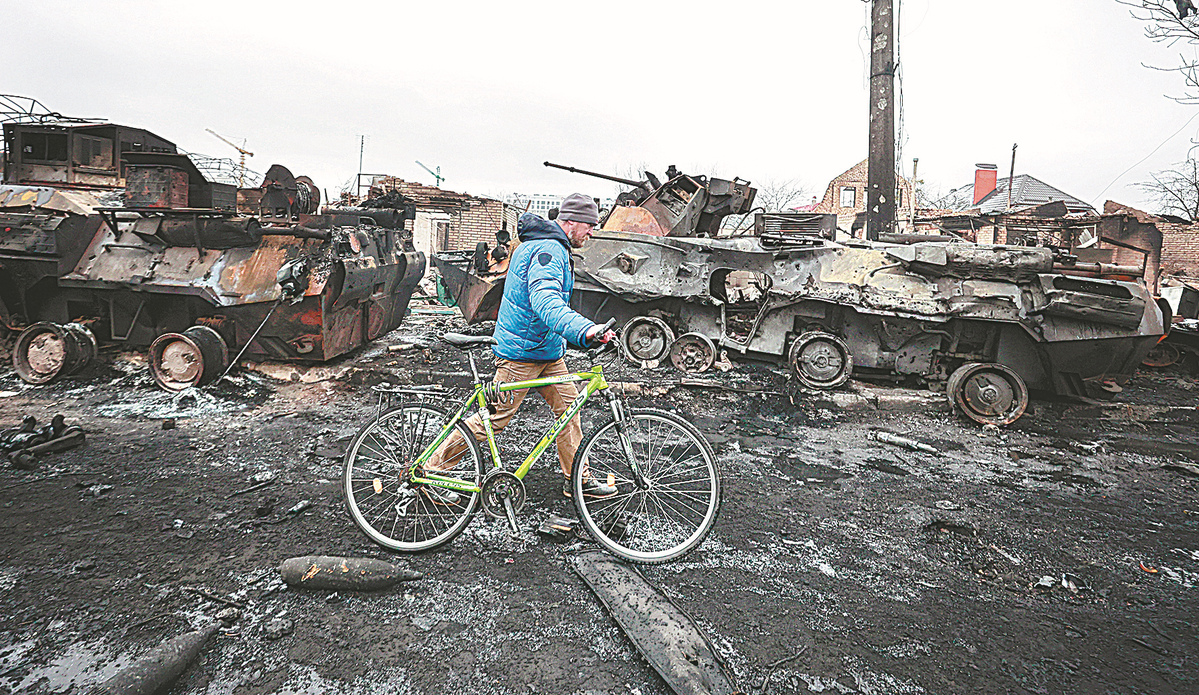
Russian airborne troops landed in the northeastern Ukrainian city of Kharkiv on Wednesday, the same day United States President Joe Biden announced the latest sanctions that ban Russian flights from US airspace.
"Russian airborne troops landed in Kharkiv … and attacked a local hospital," the Ukrainian army said in a statement on social media network Telegram in the morning, adding that there is an ongoing fight between Russian and Ukrainian troops.
Kharkiv, a largely Russian-speaking city near the Russian border, is the second-largest city in Ukraine and has a population of around 1.4 million. It has been a target of Russian forces since President Vladimir Putin launched on Feb 24 a "special military operation" in Ukraine, which intensified on Tuesday.
According to Anton Gerashchenko, adviser to the Ukrainian interior minister, a fire broke out on Wednesday in the barracks of a flight school in the city following an airstrike.
"There are practically no areas left in Kharkiv where an artillery shell has not hit yet," Gerashchenko said in a statement.
In the capital Kyiv, Russian missiles hit the city's iconic TV tower as well as surrounding areas. Ukrainian officials said the attack killed five people.
The strike also temporarily disabled broadcasting services of the Ukrainian Central TV channel, Ukraine's communications authority said, adding that the reserve broadcast facilities were activated.
Russian Defense Ministry spokesman Igor Konashenkov confirmed the missile strike, saying they had hit the Ukraine Security Service's technological facilities and the main center for psychological operations in Kyiv with high-precision weapons.
In Kherson, on the Black Sea, Russian forces took control of the railway station and the port overnight, Mayor Igor Kolykhayev told local media.
Screenshots from a local TV channel showed Russian military vehicles moving through the city, apparently unimpeded. Video footage also showed some Russian military vehicles parked on Svobody Square in the city center, where the regional administration building is located.
Konashenkov said that Kherson's basic facilities and services, including transportation, are still operating.
"The city is not experiencing shortages of food and essential goods. Negotiations are ongoing between the Russian command, the administration of the city and the region to address issues of maintaining the functioning of social infrastructure facilities, ensuring law and order and the safety of the population," Konashenkov said.
On Wednesday morning, Ukraine shut down its consulate in St. Petersburg, Russia.
US President Biden announced during his first State of the Union address on Tuesday that the US will close its airspace to all Russian flights "to further isolate Russia, adding an additional squeeze on their economy".
Apple, ExxonMobil and Boeing announced in rapid succession steps to withdraw or freeze business operations in Russia. US credit card giants Visa, Mastercard and American Express said they were blocking Russian banks from their payment networks following international sanctions.
Russia has not yet imposed retaliatory measures to the Western sanctions, Russian Foreign Ministry spokeswoman Maria Zakharova said. People in the West can already see the results of the sanctions on Russia, such as rising energy costs, she said.
Sberbank, Russia's largest lender, said on Wednesday it was leaving the European market after coming under pressure from Western sanctions.
Due to an instruction from the Russian Central Bank, Russian banks will not be able to provide liquidity to their European affiliates.

The Ukraine-Russia conflict may exacerbate the global chip shortage as both countries are an important part of the semiconductor supply chains.
Ukraine makes more than 90 percent of the world's supply of neon gas used to power the lasers that etch patterns into computer chips.
Russia is a key palladium supplier, along with South Africa, and supplies approximately 35 percent of the global demand used in sensors and memory, among other applications, according to Techcet, a California-based market research firm that specializes in critical supply chain materials and components. For the automotive industry, palladium also is a key metal used for catalytic converters.
The Semiconductor Industry Association, representing nearly all US semiconductor companies, said in a statement "the semiconductor industry has a diverse set of suppliers of key materials and gases, so we do not believe there are immediate supply disruption risks related to Russia and Ukraine".
Big semiconductor companies said they expected limited supply chain disruption from the conflict. Micron Technology, a memory chipmaker, said in a statement that the reports of potential disruption of supply of noble gases, particularly neon, are concerning for the semiconductor industry but it has diversified sourcing for all of its noble gases.
Intel Corp said it wasn't anticipating any impact to neon supply and South Korean chipmaker SK Hynix also said it has sufficient supplies of neon.
Analysts said big chipmakers usually have higher levels of inventory, but mid- and small-sized companies have fewer resources and they would feel the tightness of supplies.
But if the Russia-Ukraine conflict drags on, chipmakers will feel the impact and this will likely result in higher chip prices and longer lead times moving forward, according to a Moody's Analytics report.
The semiconductor industry has endured more than a year of worldwide shortage of chips, which has hurt a wide range of industrial sectors, with the auto industry particularly hard hit.
Companies have suffered higher costs of raw materials and lengthy delivery times for equipment and materials due to the coronavirus pandemic.
"It's just one more thing that is going to force prices up," Techcet president and CEO Lita Shon-Roy told CNBC. "The automotive market is going to feel that to be sure'', adding the price increase likely won't be felt for six months, if not a year, because most chip manufacturers have long-term agreements for such raw materials.
The White House has warned chipmakers of a supply shortage and asked them to diversify their supply chain in case Russia blocks access to key materials, Reuters reported.
Techcet estimates demand for all the materials will rise by more than 37 percent over the next four years, based on recently announced expansion plans by Intel, Samsung, and TSMC in Ohio, Arizona and Texas.

The United Nations General Assembly on Wednesday approved a resolution that calls on Russia to immediately withdraw from Ukraine.
The vote was held during an emergency special session of the General Assembly to discuss the Ukraine crisis. Of the 193 UN member countries, 141 voted in favor of the resolution. Five countries: Russia, Belarus, Syria, North Korea and Eritrea voted against it. Thirty-five nations, including China, abstained from the vote.
The resolution, which is non-binding, “demands?that the Russian Federation immediately, completely, and unconditionally withdraw?all of?its military forces from the territory of Ukraine within its internationally recognized borders”.
Zhang Jun, China’s permanent representative to the UN, reiterated that China’s basic position on the Ukraine issue is consistent and unequivocal.
“We always believe that all countries’ sovereignty and territorial integrity should be respected and that international disputes should be resolved peacefully in accordance with the purposes and principles of the UN Charter. The top priority right now is to ease the situation on the ground as much as possible and prevent the situation from escalating or even getting out of control,” Zhang said.
The ambassador noted that Russia and Ukraine have already held their first round of negotiations, and both sides have shown their willingness to continue the negotiations, despite their differences. China welcomes that, Zhang said.
“Faced with the highly complex and sensitive situation, China once again calls on the international community to stick to the overall direction of political settlement and foster an enabling atmosphere and conditions for direct dialogues and negotiations between the parties concerned,” he said.
Any action by the UN and the relevant parties should give priority to regional peace and stability and the universal security of all parties and should play a positive role for de-escalation and diplomatic solutions, Zhang said.
Regrettably, the draft resolution submitted to this emergency special session for vote has not undergone full consultations within the whole membership. Nor does it take into full consideration the history and complexity of the current crisis, he added.
It does not highlight the importance of the principle of indivisible security, or the urgency of promoting political settlement and stepping up diplomatic efforts.
“These are not in line with China’s consistent positions. Therefore we had no choice but to abstain in the voting,” he said.
The final settlement of the Ukraine crisis requires abandoning the Cold War mentality, abandoning the logic of ensuring one’s own security at the expense of others’ security and abandoning the approach of seeking regional security by expanding military blocs, Zhang said.
He emphasized the importance of giving “full attention and respect” to the legitimate security concerns of all countries, and on that basis,?conduct negotiations to put in place a balanced, effective and sustainable European security mechanism.
Blindly exerting pressure and imposing sanctions and creating division and confrontation will only further complicate the situation and result in a rapid negative spillover of the crisis and affect even more countries, Zhang said.
“We call on the international community to take a responsible attitude and promote the relevant parties to immediately return to the track of political settlement and use dialogue and consultation to seek a comprehensive solution to the Ukraine issue. China is ready to continue its constructive role in this regard,” the ambassador said.
The emergency session was called by the 15-member Security Council during a meeting on Feb 27. It was the 11th emergency session that the UN General Assembly has held since 1950.
MOSCOW - The Russian delegation has arrived at the site where the second round of talks between Russia and Ukraine are expected to take place, Russian presidential aide Vladimir Medinsky, head of the Russian delegation, said Wednesday.
The Ukrainian side is expected to arrive tomorrow morning, and both sides are expected to meet in Belovezhskaya Pushcha on the Belarus-Poland border, Russia's RIA Novosti news agency reported, citing the official.
Medinsky said Russia and Ukraine agreed upon the location for the second round of talks together, adding that Russia's military has established a safe corridor to allow the Ukrainian delegation to move through Ukrainian territory.
The possibility of a ceasefire would be discussed during the talks, among other things, according to Medinsky.
Russia and Ukraine concluded their first round of negotiations in Belarus on Monday with no clear breakthrough.
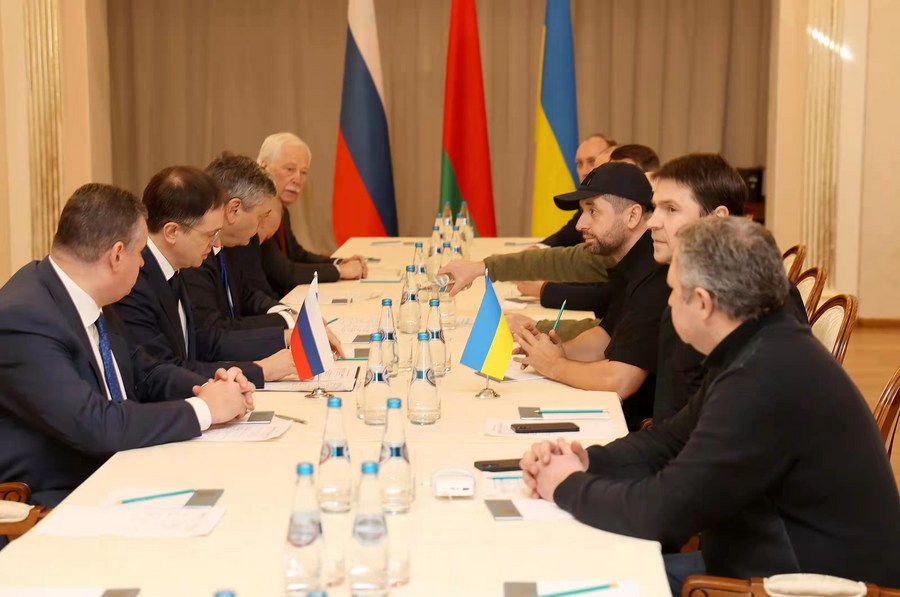
MOSCOW - The Russian delegation will wait for the Ukrainian side at the place of negotiations on Wednesday afternoon, Kremlin Spokesman Dmitry Peskov said Wednesday.
"This afternoon, probably in the evening, our delegation will be on the spot waiting for Ukrainian negotiators. Our delegation will be ready to continue the conversation tonight," Peskov said, according to Russia's RIA Novosti news agency.
Peskov didn't specify the place of the negotiations, but expressed the hope that the Ukrainian side will come to the talks.
Russia and Ukraine concluded their first round of negotiations in Belarus on Monday with no clear breakthrough.
After the talks, Russian Presidential Aide Vladimir Medinsky, the head of the Russian delegation, said that the next round of peace talks will take place on the Belarus-Poland border.

Since the tensions between Russia and Ukraine erupted into conflict on Feb 24, China has consistently called for an end to the fighting and for the two sides to engage in negotiations to reach a political solution to the crisis.
In a telephone conversation with Ukrainian Foreign Minister Dmytro Kuleba on Tuesday, State Councilor and Foreign Minister Wang Yi once again called for the two sides to resolve their differences through dialogue, saying the urgent task at hand is to de-escalate the situation on the ground as much as possible and avoid the intensification or loss of control of the conflict.
Wang said China is extremely concerned about the safety of civilians in Ukraine, where heavy fighting has resulted in more than 536 confirmed civilian casualties, with the actual number expected to be much higher, and the internal displacement of hundreds of thousands.
Chinese citizens in Ukraine are among those at risk, and the process of evacuating overseas Chinese citizens and students from Ukraine is underway. Wang expressed gratitude to the Ukrainian government and society for the support, cooperation and help they were providing.
With Russian and Ukrainian delegates due to meet again on Wednesday, China hopes that the dialogue and negotiation process can bear some fruit, heralding a political settlement that accommodates both sides' legitimate security concerns.
The international community should support the negotiations rather than trying to exploit the crisis.
In the past few days, some developments from Western countries in the name of sanctioning Russia have pointed to a worrying tendency that they view Ukraine as the venue for a proxy war with Russia. That will have a profound impact on strategic equilibrium in Europe and the world at large, and the possibility that it could even ignite a much larger conflict should not be dismissed.
The current crisis in Ukraine is the result of the clash between the strategic interests of Russia and NATO, and it is the United States that has aggravated the situation and is seeking to profit from it by pouring fuel on the fire. With such an ill trend, it is proving hard for some countries to view the situation in the clear light of reason.
The Russia-Ukraine crisis is a wound of the Cold War that has been reopened and salted by Washington. The international community, particularly the European countries, should try and step away from the biases of the past and view the situation objectively. In recent years, the history-should-be-over warriors in the US have been relentless in their efforts to revive the divisions of the Cold War. Now is the time for the rest of the world to say no.
The fear and hysteria being whipped up by Washington make it hard to defuse the Ukraine situation, but it is not impossible if countries remain rational. Further worsening of the situation must be prevented. China will support and encourage all efforts conducive to a peaceful settlement of the crisis.

China will not impose financial sanctions on Russia and will continue to have normal economic, trade and financial exchanges with the parties concerned, Guo Shuqing, chairman of the China Banking and Insurance Regulatory Commission, said on Wednesday.
"We disapprove of imposing financial sanctions on Russia, especially unilateral sanctions, as they don't work well and don't have much legal basis," Guo said at a news conference held by the State Council Information Office.
"The sanctions' economic and financial impact on China is not significant for now and requires further observation. But we believe the overall impact will not be huge because the Chinese economy and finance demonstrate tremendous stability and strong resilience," he said.

WASHINGTON - US President Joe Biden announced Tuesday that the United States will close its airspace to all Russian planes in response to Moscow's ongoing military operations in Ukraine.
Biden made the announcement while delivering his State of the Union address, the first of his presidency, to a joint session of Congress.
"Tonight I'm announcing that we will join our allies in closing off American airspace to all Russian flights, further isolating Russia and adding additional squeeze on their economy," Biden said.
The US move followed similar ones made by the European Union and Canada on Sunday.
In retaliation, the Russian aviation authority said Monday that Russia will ban airlines from 36 countries, including the 27 members of the EU, from using the country's airspace.
While condemning Russia and reaffirming US support for Ukraine, Biden reiterated in his speech that US forces "are not engaged and will not engage in the conflict with Russian forces in Ukraine."
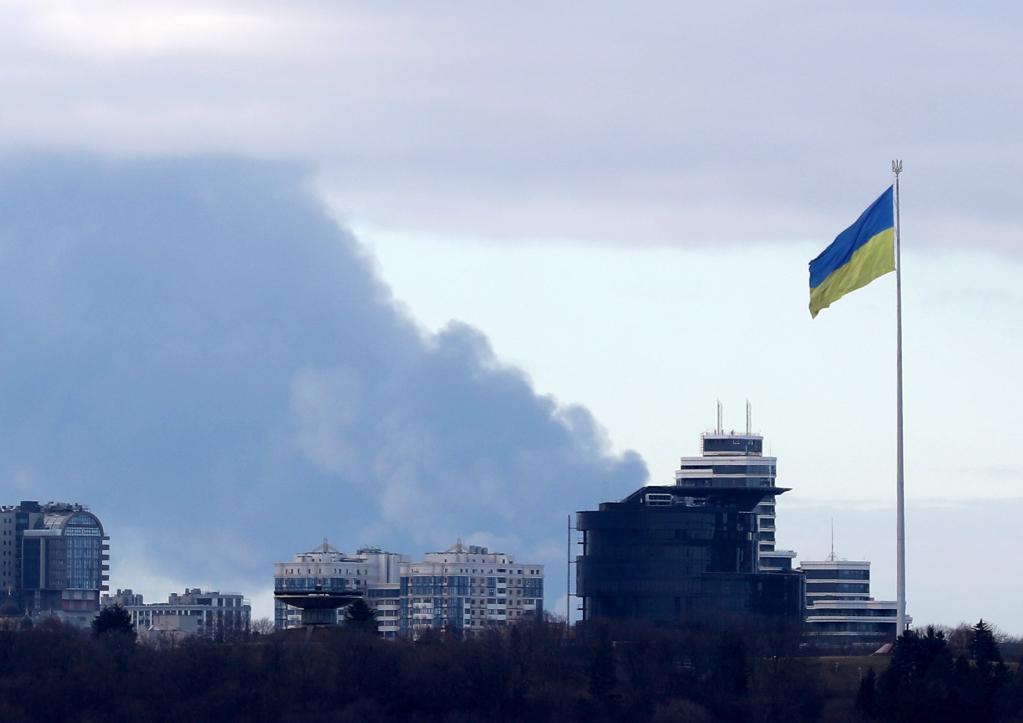
The United States is sending advanced weapons and other arms to Ukraine amid its conflict with Russia, but the effort is not without logistical challenges.
The push to provide the weapons is "complicated by limited supply lines, a potentially small window to save Kyiv from collapse and a Cold War legacy that made Western small arms ammunition incompatible with those produced in the Eastern Bloc", The Wall Street Journal reported Tuesday.
A senior US defense official, however, said, "We believe it is getting into the right hands, that they are actively using these systems," the Journal reported.
On Tuesday, in a speech delivered via video to the United Nations Human Rights Council in Geneva, Russian Foreign Minister Sergei Lavrov accused the West of anti-Russian "hysteria".
Lavrov said "it was and still is the aim of the US and all its allies built by Washington to create an 'anti-Russia'".
The diplomat said he had planned to attend the session in person but bans on flights by European countries from Russia had prevented him from traveling to Switzerland.
During the speech, in which more than 100 mostly Western diplomats walked out, Lavrov also said that the United States should remove its nuclear weapons from Europe.
On Friday, the White House approved a direct delivery of Stinger missiles to Ukraine. The Stingers are highly accurate and are used to shoot down helicopters and other aircraft.
They are made by Tucson, Arizona-based Raytheon Missiles & Defense, a subsidiary of Raytheon Technologies Corp, based in Massachusetts. Each missile has an estimated cost of about $117,000.
"The Stinger-Reprogrammable Microprocessor, or RMP, missile has … supersonic speed, agility and a highly accurate guidance and control system (that) give the weapon an operational edge against cruise missiles and all classes of aircraft. The system is also used on Apache helicopters for air-to-air engagements," the Raytheon website says.
US President Joe Biden, who was scheduled to deliver his first State of the Union address Tuesday night, on Saturday authorized the State Department to send $350 million in weapons to Ukraine.
In an excerpt of the speech released by the White House, Biden says: "He (Putin) thought the West and NATO wouldn't respond."
The $350 million includes Javelin anti-tank weapons.
"Javelin is probably quite effective against most Russian armored vehicles, and it is probably more capable against heavy armor (like tanks) than any other missile system available to Ukraine that can be carried by an individual soldier," Scott Boston, a senior defense analyst at RAND Corp, told Euronews Next.
The Javelin is produced jointly by Raytheon and Lockheed Martin, based in Bethesda, Maryland. Each Javelin missile costs about $175,000, according to the Pentagon's 2021 fiscal year budget.
"These weapons will be extremely useful even if Russian forces are able to seize cities like Kyiv, and Ukrainian forces shift to insurgent operations," Seth Jones, director of the international security program at the Center for Strategic and International Studies, told USA Today.
Jones said there is some risk that using US and other Western arms against Russian soldiers could escalate the war. He noted that the US provided weapons to insurgents in Afghanistan, who used them against Soviet troops after they invaded in 1979.
The Russians supplied limited arms to the Taliban to use against US troops in Afghanistan, and Iran supplied Shiite insurgent groups with weapons to attack US troops in Iraq, according to Jones.
On Monday evening, Ukraine's ambassador to the US told senators her country needs more weaponry. Senators emerged from a meeting with Ambassador Oksana Markarova at the Capitol as Congress prepares supplemental funding for Ukraine. The White House is seeking at least $6.4 billion in military and humanitarian aid.
"They need more arms," said Senator Mark Warner, a Virginia Democrat and chairman of the Intelligence Committee.
"They've got the weapons they need right now, but they're going to run out of what they need soon, so we've got to get a supplemental (spending bill) passed quickly," Senator Chris Murphy, a Connecticut Democrat, said after the meeting.
"It's David versus Goliath," said Senator Jim Risch of Idaho, the top Republican on the Foreign Relations Committee. "I think that any human being reading the reports coming out of there realize that this is dire."
On Friday, Pentagon spokesman John Kirby said, "we're very actively engaged in those efforts to help them better defend themselves through both lethal and non-lethal assistance".
"The airspace over Ukraine is contested; the Russians don't have superiority of it," Kirby said.
US Secretary of Defense Lloyd Austin told House lawmakers that the US is considering ways to train Ukrainian soldiers remotely if Russia seizes Ukraine, Axios reported.
The Associated Press contributed to this story.
Member countries of the International Energy Agency (IEA) on Tuesday agreed to release 60 million barrels of crude reserves — half of it from the United States — to try to curb soaring oil prices stemming from the Ukraine-Russia conflict.
But the move didn't affect oil prices, with Brent crude rising to nearly $107 a barrel after the announcement, its highest level since 2014, while energy experts said the release won't do much to stop surging prices.
"The bottom line is this is not enough to cool off the market. It's a bit of a Band-Aid solution," said Michael Tran, managing director of global energy strategy at RBC Capital Markets.
"You need to super-size the numbers," said Robert Yawger, vice-president of energy futures at Mizuho Securities.
In a note Tuesday, Louise Dickson, the senior oil market analyst at Rystad Energy, said the participating OPEC members are producing about 800,000 barrels a day below their promised stated target levels, "adding to the shortness in the supply market and further stoking the bullish price environment".
The Paris-based IEA said in announcing the release that "global energy security is under threat'' because of the conflict.
"The situation in energy markets is very serious and demands our full attention," said Fatih Birol, IEA executive director, putting "the world economy at risk during a fragile stage of the recovery".
The IEA's decision to tap oil reserves represents its first release since the Libyan civil war in 2011. Prior to that, the IEA released oil reserves during the 1991 Gulf War and the 2005 hurricane season that included hurricanes Rita and Katrina. The reserves were established in the wake of the Arab oil embargo in 1974.
The IEA also includes Germany, France, the UK, Italy, the Netherlands, Japan, South Korea and Canada. They hold emergency stockpiles of 1.5 billion barrels of oil.
While half of the release will come from the US Strategic Petroleum Reserve, the rest will come from Europe and Asia.
The US oil release will represent the Biden administration's second tapping of the Strategic Petroleum Reserve of 600 million gallons stored in underground salt caverns in Louisiana and Texas.
In November, President Joe Biden announced the release of 50 million barrels of oil from the US reserve, but the measure had only a small impact on oil prices.
The White House said in a statement that Biden "was clear from the beginning that all tools are on the table to protect American businesses and consumers, including from rising prices at the pump".
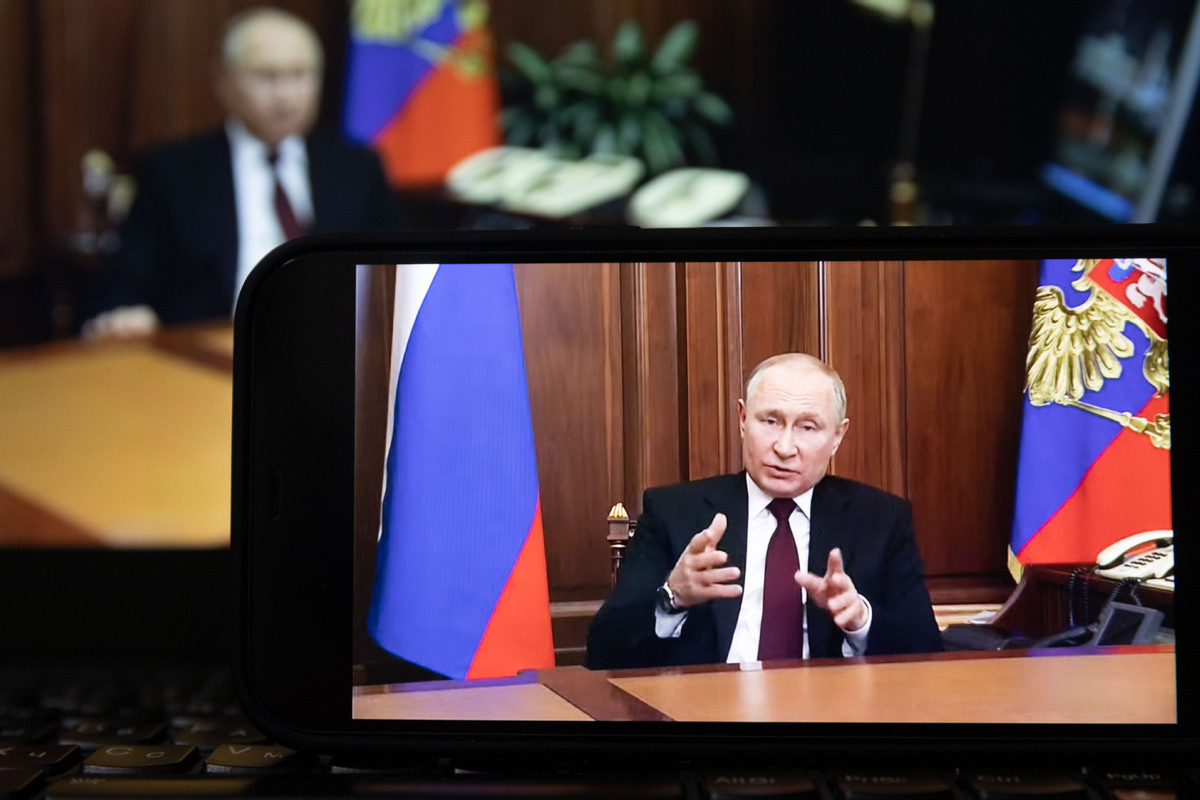
MOSCOW -- Russian President Vladimir Putin signed a decree introducing temporary economic measures to ensure the country's financial stability, the Kremlin announced Tuesday.
These measures will be taken in response to anti-Russian sanctions by the United States, other countries and international organizations, according to the decree.
Among the measures, Russia will ban the outflow of foreign currencies in an amount exceeding the equivalent of $10,000 starting Wednesday.
Effective since Wednesday, restrictions regarding transactions of securities, real estate and loans will be imposed on foreigners associated with countries that have taken anti-Russian actions.
On Monday, Putin also inked a decree introducing "special economic measures" to cushion the impact of a new wave of Western sanctions amid Russia's special military operation in Ukraine.
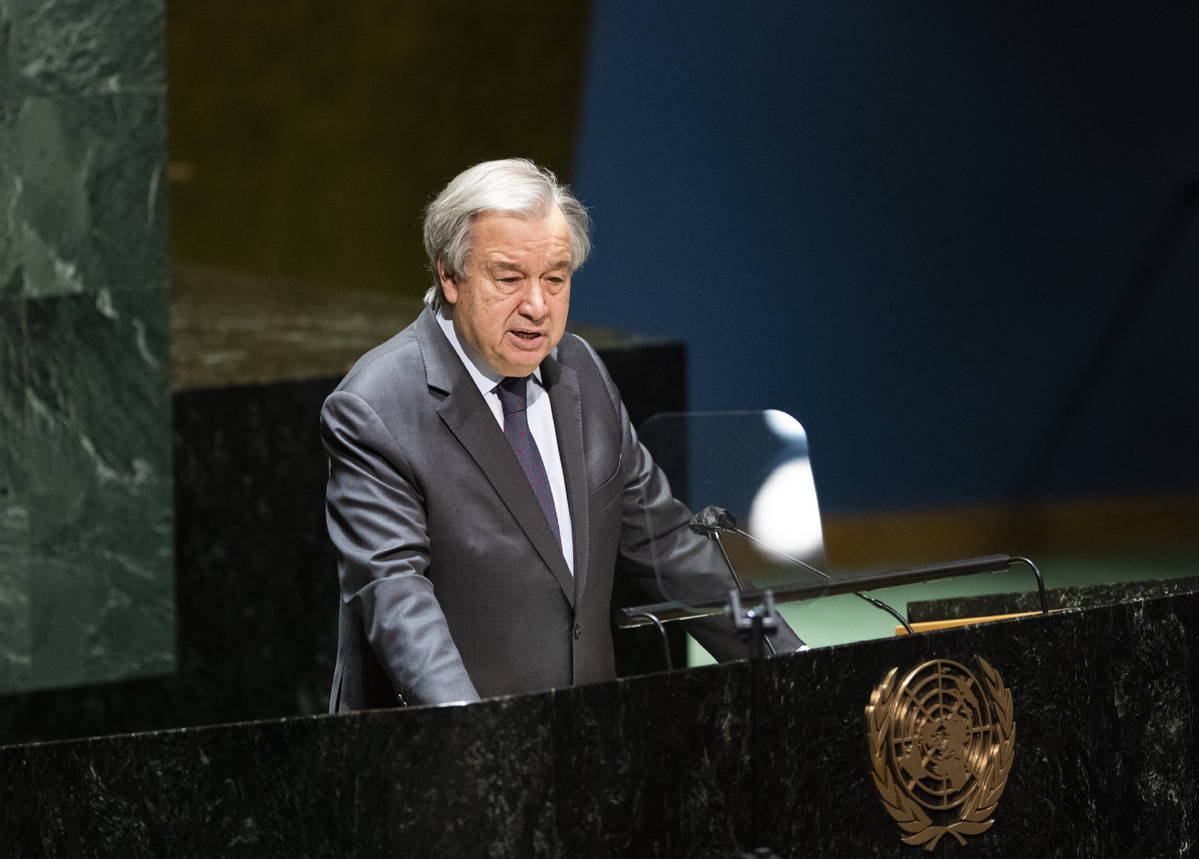
UNITED NATIONS - UN Secretary-General Antonio Guterres on Tuesday called for resources to meet the increasing humanitarian needs in Ukraine and for efforts to end the conflict.
"The international community must give them our unequivocal support. We must help Ukrainians help each other through this terrible time," he said at the launch of a flash appeal for Ukraine and a regional refugee response plan for neighboring countries.
The three-month flash appeal for Ukraine requires ¥1.1 billion to meet the humanitarian needs of more than 6 million people affected and displaced by military operations. The regional response plan needs 551 million dollars to help Ukrainians who have fled across borders, principally to Poland, Hungary, Romania and Moldova.
"I urge you to respond to these life-saving appeals," Guterres told the launch event in Geneva via video teleconference.
He warned that the crisis in Ukraine could have a serious impact on vulnerable people around the world -- not only because it will stretch humanitarian funding even further, but because Ukraine is a vital source of grains.
The World Food Programme buys more than half its wheat from Ukraine. Disruption to the harvest could drive up prices and add to global hunger, he warned.
This speaks to the urgent need for global solidarity -- not only to fund humanitarian aid programs, but to invest in peace, he said.
"The most effective humanitarian relief is to silence the guns. Now, more than ever, we must intensify our efforts for peace, everywhere," he said. "Soldiers must return to their barracks. Leaders must turn to diplomacy. I urge all those with influence to use it to end this senseless conflict."
UN agencies and partners are working 24/7 to assess humanitarian needs and scale up aid, particularly to women, children, older people and those with disabilities, he said.
The United Nations is coordinating partnerships between organizations and groups inside and outside Ukraine, and surging personnel into the country. "As we ramp up our efforts, it is essential that all humanitarian workers are safe and protected, and have guaranteed freedom of movement," he said.
"Unimpeded access to all affected people and communities must also be guaranteed. I call on all sides to uphold their obligations under international humanitarian law," said Guterres.
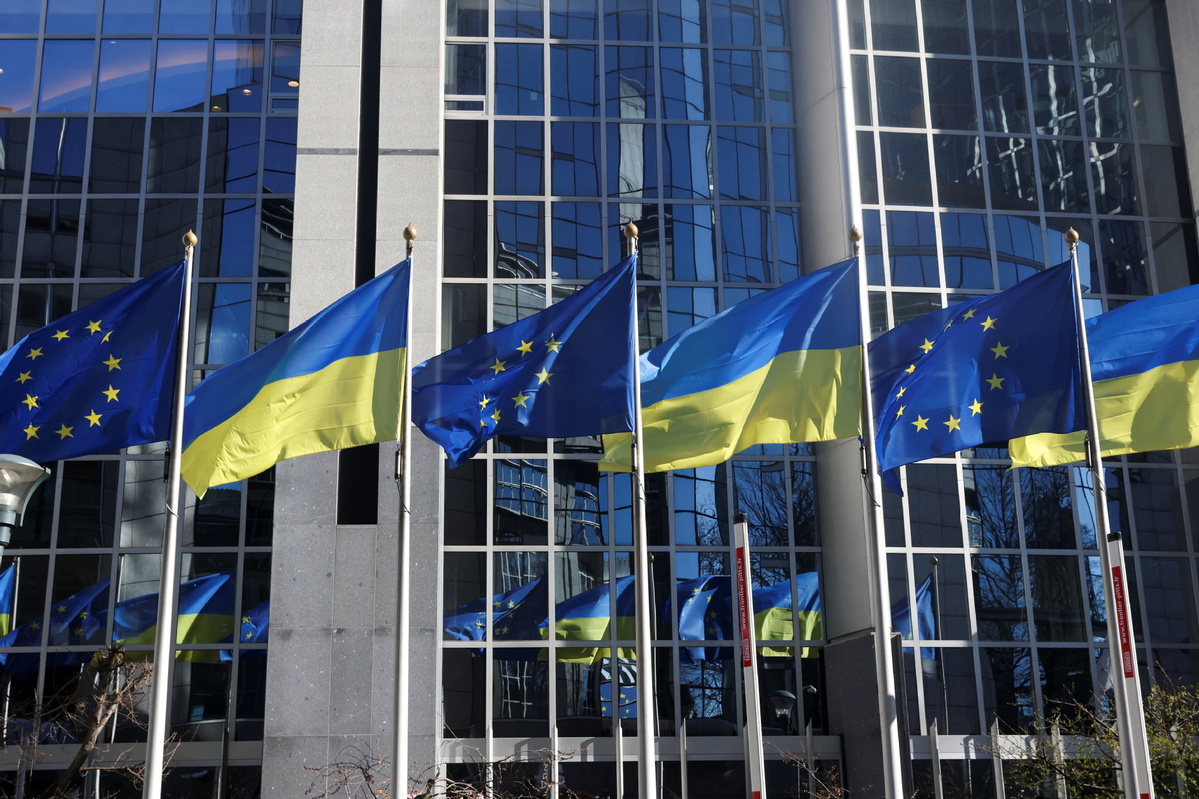
Zelensky signs application but fast approval unlikely within divided bloc
Ukrainian President Volodymyr Zelensky formally signed an application on Monday for his country to join the European Union, but the prospects for a quick accession are remote despite the support offered by several EU member states.
The signing came after Zelensky made a call for the EU to accept Ukraine and comments by European Commission President Ursula von der Leyen that "they are one of us and we want them in".
"We ask the European Union for Ukraine's immediate accession via a new special procedure," Zelensky said on Monday.
"Our goal is to be together with all Europeans and, most importantly, to be on an equal footing. I'm sure it's fair. I am sure it's possible."
But the decision on Ukraine's membership must be made by the EU's 27 member states, with a unanimous agreement required for acceptance of any new member. And within the EU, there has been little public appetite over the past years for EU enlargement.
European Council President Charles Michel told French TV station BFM on Monday that there will be a debate about making Ukraine a member of the EU.
"This is a debate which, in any case, will be held," he said, adding that the EU already had a "very powerful" association agreement with Ukraine which could be reinforced.
He also admitted earlier that there were "different opinions and sensitivities within the EU on enlargement".
The European Parliament published a motion on Monday night with the support of all the parliament's major political groups. It called on the EU to push toward "granting EU candidate status to Ukraine".
On Monday, the presidents of eight Central and Eastern European nations called on EU member states to immediately grant Ukraine the status of an EU candidate and to open membership talks.
The presidents of Bulgaria, the Czech Republic, Estonia, Latvia, Lithuania, Poland, Slovakia, and Slovenia said in an open letter that they "strongly believe that Ukraine deserves receiving an immediate EU accession perspective".
Measured responses
But Germany and France, the EU's two most influential members, gave measured responses on Monday to the calls for Ukraine's fast-track membership.
"Ukraine is part of this European house, and we know that the desire of many Ukrainians is and was to have closer ties with the EU," German Foreign Minister Annalena Baerbock told a news conference in Berlin along with Slovenian counterpart Anze Logar.
"Everyone is aware, as the president of the (European) Commission emphasized yesterday, that joining the EU is not something that can be done in a few months, but that it involves an intensive and far-reaching transformation process."
An Elysee Palace official said that France welcomed Ukraine's EU aspirations but they should be part of a broader debate on the future of the bloc, also including other would-be members.
Albania, North Macedonia, Montenegro, Serbia and Turkey are the five official candidates for EU membership. Some accession talks have lasted more than a decade with no conclusion in sight.
The EU members have a mutual defense clause under the Treaty of Lisbon. It requires other members to aid a country if it's "the victim of armed aggression on its territory", which might further complicate Ukraine's EU membership prospect.
Amid increasing sanctions from Western countries, Brazil's President Jair Bolsonaro, however, said on Monday that Brazil will not impose sanctions on Russia, according to multiple media reports.
Agencies contributed to this story.
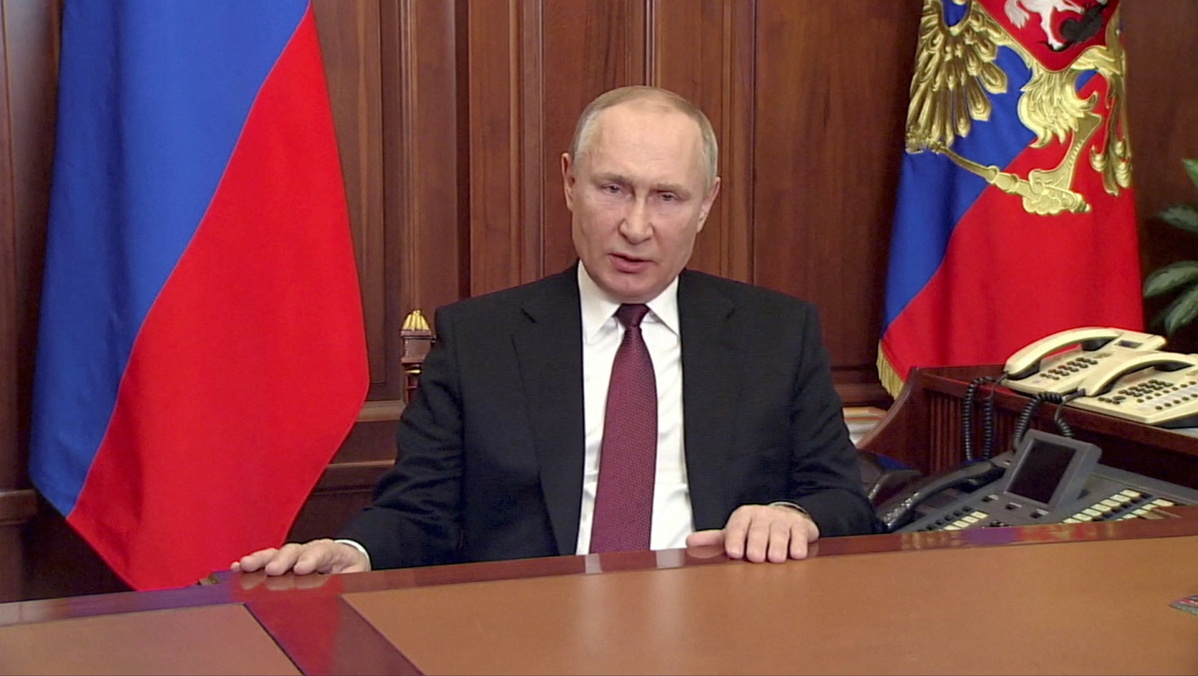
Russian analysts say nuclear high-alert order intended to cool any 'hotheads' on other side
Russian President Vladimir Putin's order to place his country's nuclear forces on high alert is part of a pattern of escalating tensions following his "special military operation" on Ukraine.
Putin justified this decision by citing the West's "unfriendly economic actions", as well as the "aggressive "rhetoric against Moscow.
According to Russian experts, this is the first time Russia's nuclear forces have been put on high alert since the end of the Cold War, even though the United States declared that NATO did not pose a threat to Russia.
"Most likely, we are talking about bringing the control system of nuclear forces into a state that makes deterrence forces more stable in the event of an attack," Pavel Podvig, director of the Russian Nuclear Forces Project and senior researcher at the UN Institute for Disarmament Research, told Russian newspaper Kommersant.
"Overall, once a containment force has been brought to this point, it becomes less vulnerable to a first strike. However, this does not mean that Russia is going to attack first."
Western powers including the US and NATO protested sharply after Putin said in a televised address that the country's nuclear "deterrence forces" had been placed on "a special mode of combat service".
The UN called the idea of using nuclear weapons "inconceivable", while Ukraine's government said it saw the move as an attempt at intimidation, as delegations from both countries met for talks on Monday.
Just as within NATO, some of Russia's nuclear weapons are in constant readiness and "can be launched within 10 minutes," said Marc Finaud, a nuclear proliferation expert at the Geneva Centre for Security Policy.
"Either the warheads are already mounted on missiles, or the bombs are already aboard bombers and submarines."
Putin warned last week that if other countries interfered with Russia's plans they would face consequences the "like of which they have never seen".
That statement was widely interpreted as a warning to NATO about direct military involvement in Ukraine. NATO has always been clear that it will not become militarily involved, knowing it could trigger direct conflict with Russia.
Vasily Lata, a senior research fellow at the Academy of Strategic Missile Forces, said Putin's order sought "not to escalate the conflict with the West, but on the contrary, to prevent its aggravation".
Lata believes that through this decision, Putin again warned the US and NATO that meddling in the military conflict in favor of Ukraine was unacceptable and Russia is ready to take "decisive measures".
"At present, it is a necessary and reasonable decision. This will cool any hotheads on the other side," he said.
Viewed in this way, the nuclear alert is a way of emphasizing this message to his own people, the BBC said.
Another way of seeing it is that Putin is worried about Western plans to provide military assistance to the Ukrainians and wants to warn them about not doing too much.
During the Cold War, a huge intelligence machine was created in the West to watch Moscow's nuclear arsenal. Satellites, intercepted communications and other sources were analyzed to look for warning signs such as preparing weapons or aircrews to operate bombers.
Much of that intelligence machine remains in place, and the West will be now watching Russia closely to understand if there is going to be any significant change in behavior.
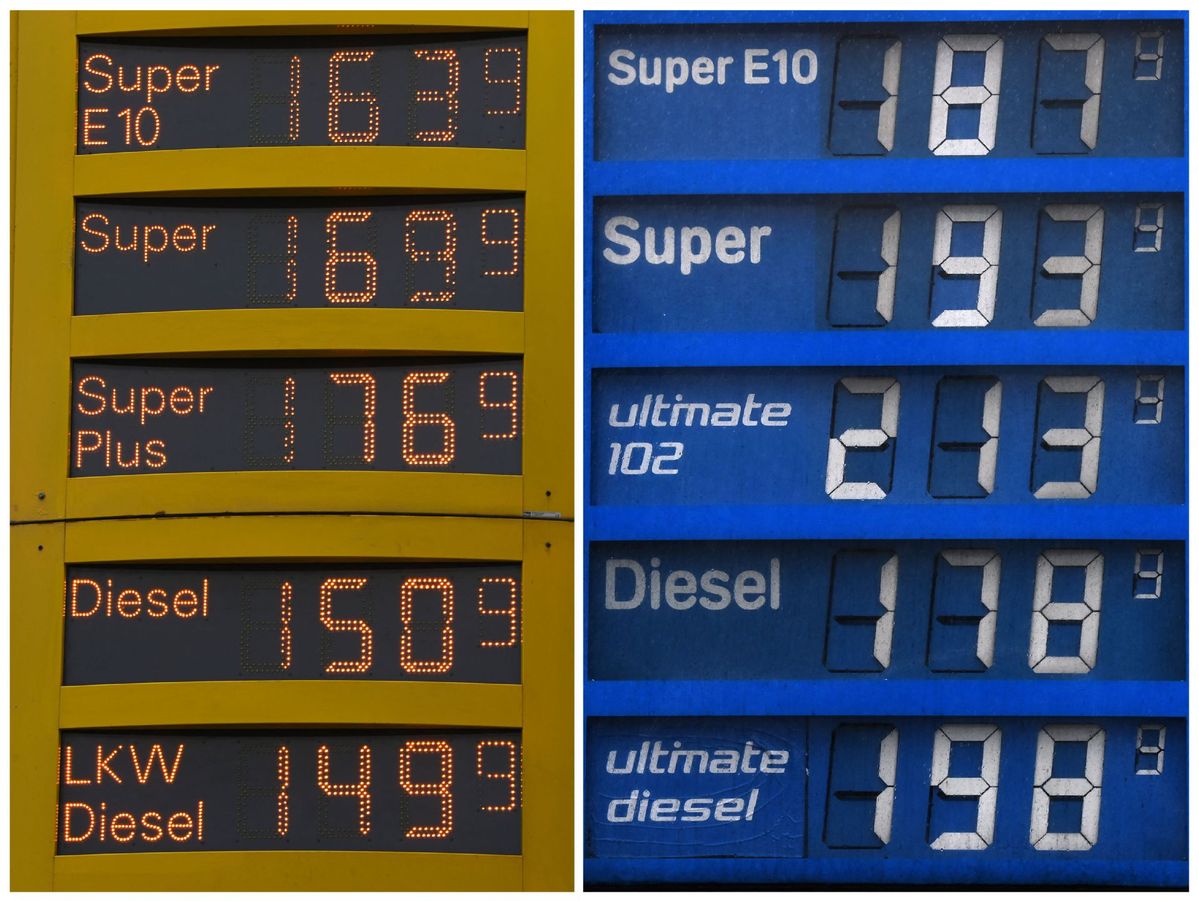
The impact of the Russia-Ukraine crisis is heightening concern about global supply chains as Europe's benchmark gas and oil prices continued to rise.
Key gas listings on the United Kingdom's trading markets jumped as much as 27 percent and later settled up 5 percent on Monday, reflecting increases across Europe.
The crisis has caused oil prices to soar above $100 a barrel for the first time in nearly a decade, the Reuters news agency said. This is six times higher than a year ago.
The Times newspaper reported that Russian gas supplies to Europe may be interrupted as a consequence of sanctions against President Vladimir Putin's regime.
Russia historically provides around 40 percent of the European Union's natural gas supply and approximately 50 percent of Germany's, noted the Oilprice.com news site.
An analyst at Goldman Sachs, quoted by The Times, said markets must reflect "the risk that Russian commodities eventually fall under Western restrictions".
A 65-kilometer long Russian military convoy was heading toward the Ukraine capital Kyiv on Tuesday after ceasefire talks between Russia and Ukraine failed to reach a breakthrough, said Reuters.
An oil market analyst, quoted by Reuters, said prices could continue to rise.
"The fragile situation in Ukraine and financial and energy sanctions against Russia will keep the energy crisis stoked and oil well above $100 per barrel in the near-term and even higher if the conflict escalates further," said Louise Dickson, from Rystad Energy.
Fossil fuel prices will inevitably impact costs for consumers and businesses, said The Times, which noted that UK households were already bracing for a 54 percent jump in energy bills, to almost 2,000 pounds ($2,680) a year from April.
The paper noted that the UK has no direct pipeline links to Russia, but partly depends on Russian supplies into Europe. It said any disruption to the European supply would increase the continent's demand for liquefied natural gas shipments.
In a social media post, Kwasi Kwarteng, the UK's business secretary, said: "Unlike Europe, we're not reliant on Russian gas. But like others, we are vulnerable to high prices set by markets. The situation we are facing is a price issue, not a security of supply issue. Put simply: we have lots of gas from highly diverse and secure sources-but it is very expensive."
The Daily Telegraph reported that the British government is working with European allies to increase deliveries of liquefied natural gas at ports across the continent, in order to lower dependence on Russian gas supplies.
If this was achieved, then new sanctions could target Russian energy companies.
The UK, the United States, and others have so far resisted imposing sanctions on Russian gas giants including Rosneft and Gazprom.
According to The Telegraph, fossil fuels account for more than 60 percent of Russia's exports.
